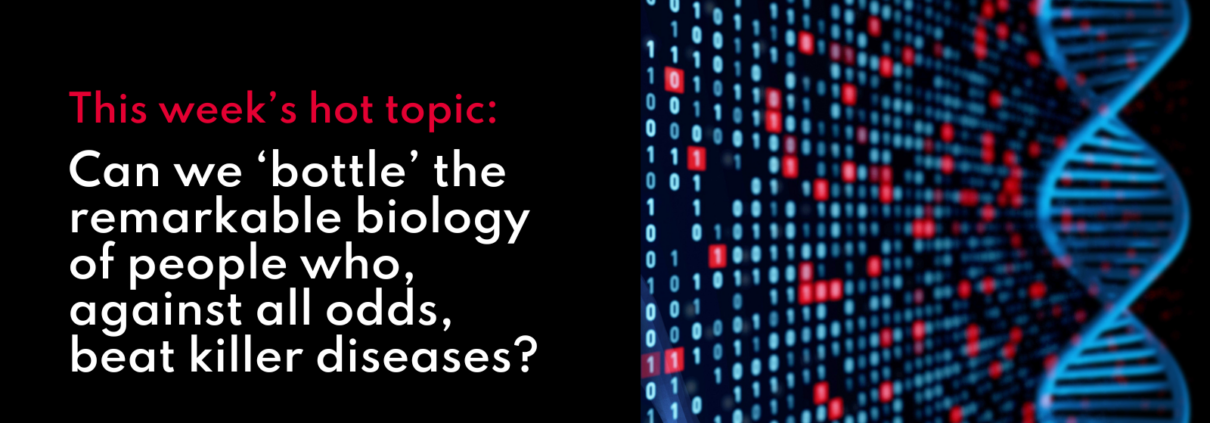Optimum’s hot topic: Can we ‘bottle’ the remarkable biology of people who, against all odds, beat killer diseases?
By Stephen Adams, Optimum Strategic Communications
Nature has been an inspiration behind the development of many drugs, starting with the humble aspirin, which was originally derived from willow bark.
But what if we could learn the secrets of what gives some people the incredible ability to overcome the most serious diseases?
What if we could learn why they survive, when others don’t, and bottle it?
It sounds like the stuff of fiction – and it’s remarkable that Hollywood doesn’t seem to have made a movie yet based on the idea.
It isn’t science fiction though: it is happening now.
A range of companies is currently delving into the biology of these remarkable individuals to create new treatments for illnesses including Alzheimer’s, autoimmune diseases and cancer.
The idea is to pinpoint the unique genes, antibodies, or other attributes that these fortunate few possess, to use as an inspiration for new drugs to benefit the many.
Cambridge (UK) based Alchemab, which is using the approach to find outstanding antibodies, already has three assets in preclinical development. One is for Alzheimer’s disease, another for Huntington’s, and a third for frontotemporal dementia with amyotrophic lateral sclerosis (FTD-ALS) – while it also has a number of early discovery leads in oncology.
Amsterdam’s Kling Therapeutics is doing something similar in cancer and infectious diseases.
And a French start-up called Cure51, backed by Sofinnova Partners, a leading life sciences VC, is scouring the continent for ‘super-survivors’ of three particularly aggressive types of cancer, to find out why they are still alive.
These firms are trying to find common factors among such individuals to make powerful new drugs, although they are going about it in different ways.
Alchemab’s CEO Jane Osbourn, OBE, who was previously vice president of R&D biologics at AstraZeneca, explained: “Our unique approach starts by identifying groups of resilient individuals, such as long-term survivors of cancer or people with slow-to-progress neurodegenerative disorders.
“Alchemab mines the antibody receptors of such individuals to identify naturally occurring protective antibodies.
“We then develop these antibodies into therapeutic products for broader use in patients who lack this protective response and are suffering from hard-to-treat diseases.”
Alchemab’s method involves sequencing B-cells from individuals who are resilient in the face of a particular disease. B-cells are a type of white blood cell which make infection-fighting antibodies. The idea is to determine if there are antibodies that are common to these lucky individuals which protect them, and which could be used as the bases for new antibody-based drugs.
Kling Therapeutics is also ‘interrogating’ B-cells of elite responders, although it is at an earlier stage and currently has a broader focus.
Stefano Gullà, Chief Scientific Officer of Kling Biotherapeutics, said while B-cells could be considered “tiny drug factories” creating antibodies, they also had a wider role in coordinating the body’s immune response and identifying tumour-associated antigens.
The antigens themselves could be used to create novel therapeutics – not only antibody-based drugs, but other modalities too, he said.
Meanwhile, Cure51 is working with some of the world’s leading cancer hospitals to identify people who have survived for many years with advanced pancreatic cancer, the brain cancer glioblastoma, or advanced small cell lung cancers – diseases which usually kill within 12 months of diagnosis.
Cure51 has already identified well over 1,000 such individuals across 35 countries and has just launched a major arm of its ‘Rosalind’ study in the UK.
It is building a huge database of the biological characteristics of these people and their tumours – data gleaned from biopsies of their tumours will be entered too – including genetic, protein and biomarker information.
Co-founder Nicolas Wolikow said: “Cancer is a very pernicious disease because it is a disease that mutates. So, it is very intelligent.
“We are going to try to become as intelligent as it is. Depending on your genetic heritage and your environment, it will adapt. So, the idea is to understand why these exceptional survivors managed to overcome these mutations.”
It’s still early days for the concept of mining the biological data of super-responders to create new treatments. Let’s hope they strike gold.


